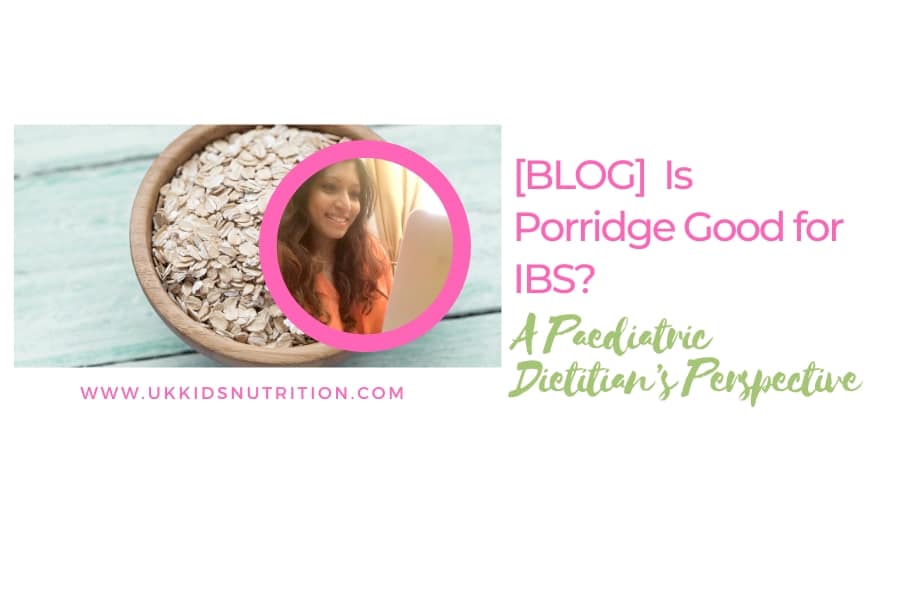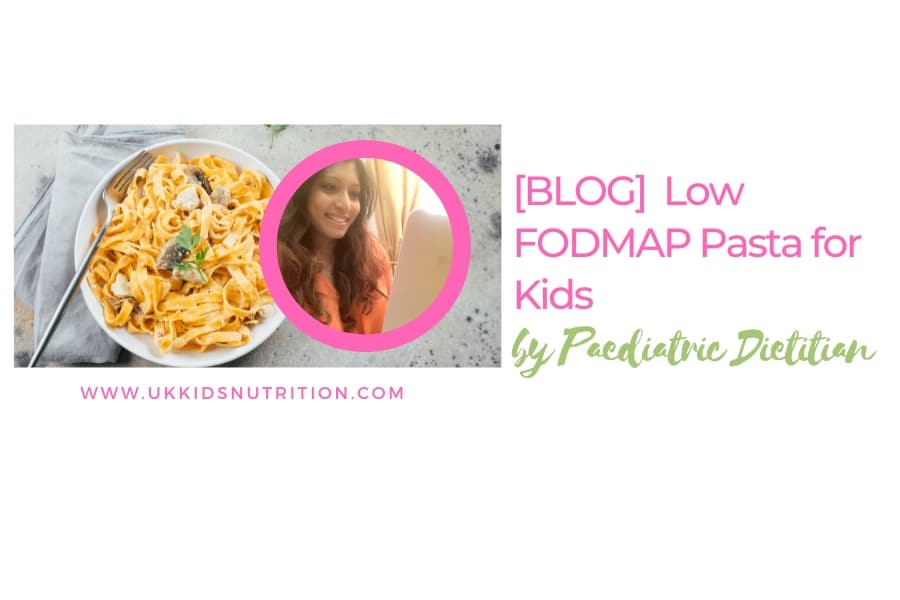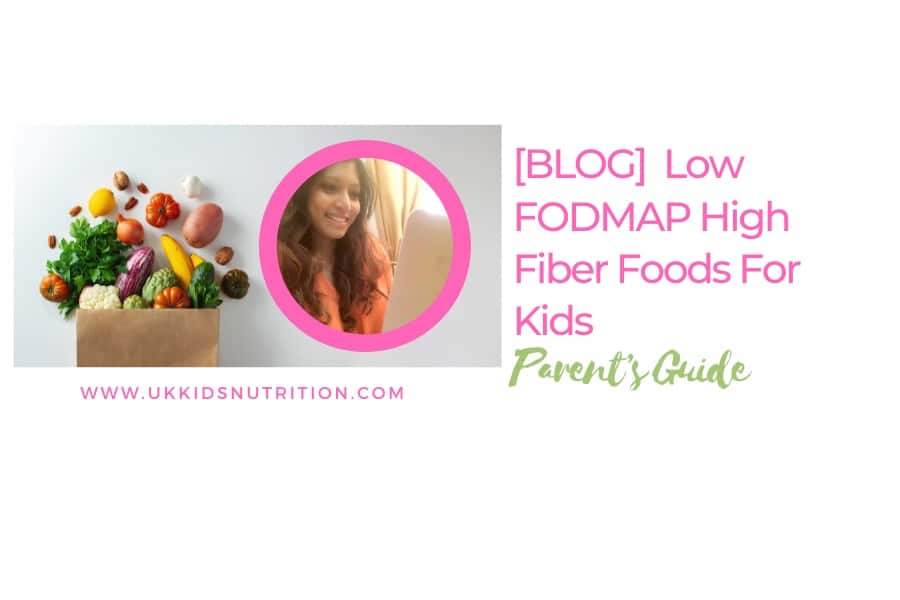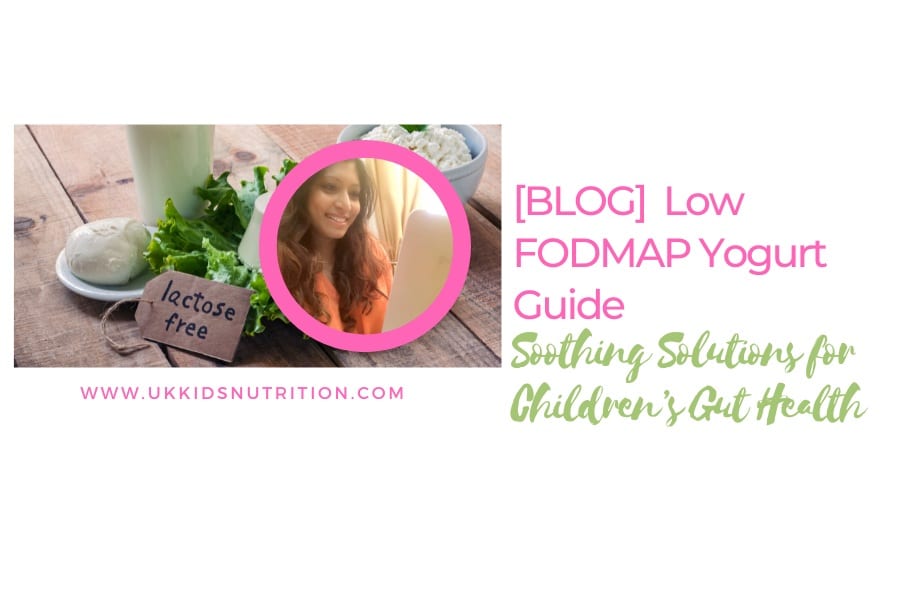You ponder, “Is porridge good for IBS?” as your child eagerly awaits their breakfast.
You’re not alone in wondering whether porridge is suitable for children’s tummy troubles.
I’m a registered paediatric dietitian, your guide today.
In this article, we’ll explore how porridge, a staple in a low FODMAP diet, can comfort your child with Irritable Bowel Syndrome (IBS).
We’ll explore porridge’s nutrition and science, seeking to understand if this breakfast staple eases your child’s sensitive tummy.
Join me in uncovering whether porridge can be your child’s gut-friendly morning hero.
This is a conversation about porridge, IBS and nourishing your child’s gut health, from a paediatric dietitian’s perspective.
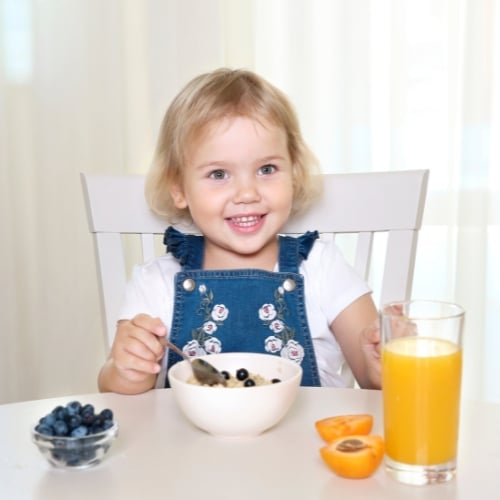
Oats vs Oatmeal vs Porridge – What’s the Difference?
Ever wondered about the fine line between oats, oatmeal, and porridge?
Understanding the difference between oats, oatmeal, and porridge is crucial for managing IBS symptoms and soothing bowel syndrome.
Let’s clarify. Oats are whole grains, while oatmeal is what you get when those oats are ground into a coarse or fine powder.
Porridge, however, takes it a step further, turning oatmeal into a warm, comforting dish by cooking it with water or milk.
But, you might be wondering, how does this relate to IBS and its dietary nuances?
Let’s explore precisely that next. Is one of these options more IBS-friendly than the others? Let’s dive in.
How Do Porridge Oats Affect IBS Symptoms?
Let’s unravel the magic of oats in soothing IBS symptoms in children.
Oats are more than just a nutritious option; they are a source of resistant starch, which holds significant relevance for your child’s gut health.
Resistant Starch
Oats are a source of resistant starch, beneficial for gut health. This section discusses how oats, especially in forms like overnight oats and rolled oats, impact IBS symptoms, focusing on their low FODMAP content and soluble fibre benefits.
Resistant starch is a carbohydrate that the small intestine doesn’t fully digest.
Instead, it travels to the large intestine or colon where it feeds beneficial gut bacteria.
This feeding produces short-chain fatty acids, which promote a healthy gut environment and aid digestive well-being.
This benefit is particularly helpful for children with IBS.
Resistant starch positively affects the gut microbiome, easing IBS-related discomfort.
Both children and adults with IBS usually tolerate oats well.
They are low in fermentable sugars, known as FODMAPs. FODMAPs often trigger bloating, diarrhoea, or constipation in some IBS patients.
It’s important to remember that food sensitivities can vary individually.
Overall, oats positively impact IBS symptoms by providing soluble fibre, which helps improve bowel regularity.

Why Are Oats Good for IBS?
Porridge, primarily made from oats, is excellent for managing IBS symptoms in kids.
This part explores the magic of soluble fibre in porridge, particularly beta-glucan, and its role in easing constipation-predominant IBS symptoms.
Soluble Fibre Magic
Porridge’s secret weapon is its soluble fibre content (particularly beta-glucan).
This fibre has an exceptional talent for absorbing water, creating a gel-like texture in the digestive system.
For a convenient option, overnight oats, made with rolled oats, can be a game changer for children with IBS, especially those experiencing constipation-predominant symptoms.
The gel-like consistency helps soften stools, making those bathroom visits smoother and more comfortable.
Gentle on Tiny Tummies
Oats are usually well-tolerated by children with IBS because they are low in fermentable sugars known as FODMAPs.
This gentle quality makes porridge good for IBS.
Nutritional Goodness
Enhance your child’s porridge with peanut butter or fruit, making it not only a gut-friendly meal but also one of the many healthy snacks in their diet.
Porridge is usually also prepared with milk which is an important source of protein, iodine and calcium for children.
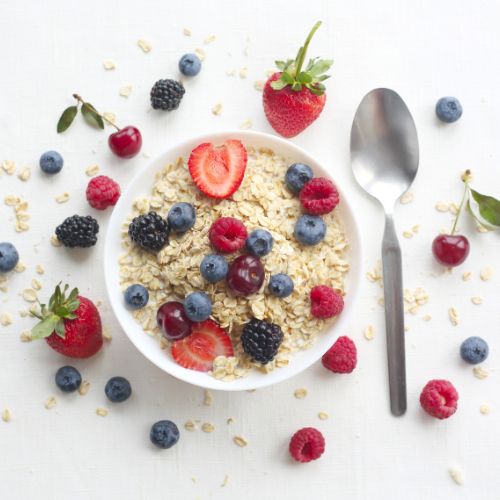
Are Porridge Oats Good for Constipation?
Oats play a crucial role in alleviating constipation for both children and adults.
Their high content of dietary fibre, particularly the soluble fibre known as beta-glucan, is instrumental in this regard.
This soluble fibre is remarkable in its ability to absorb water, forming a gel-like consistency in the digestive tract.
For children suffering from IBS, where constipation is a primary symptom, introducing oats into their diet can be particularly effective.
The gel formed by the soluble fibre softens the stool, promoting more regular bowel movements and thereby easing the discomfort commonly associated with constipation.
For natural relief from constipation, consider oats as a dietary addition.

Are Porridge Oats Good for IBS Diarrhoea?
In the case of IBS with predominant diarrhoea symptoms (like toddler diarrhoea), oats can also be beneficial.
While they are widely recognised for their effectiveness in managing constipation, thanks to their soluble fibre content, their role in controlling diarrhoea is equally notable.
The same soluble fibre, beta-glucan, contributes to regulating bowel movements by adding bulk to the stool.
During episodes of diarrhoea, this bulking quality can help absorb excess water in the digestive tract, leading to firmer stools and potentially reducing the frequency of diarrhoea.
Incorporating oats into the diet can thus be a supportive strategy for managing IBS-related diarrhoea.
Other Benefits of Oats
Oats offer a multitude of benefits beyond their role in managing IBS symptoms.
Here are some of the notable advantages:
Improving Gut Health with Oats
Oats play a crucial role in enhancing overall gut health in children.
Their high soluble fibre content, especially beta-glucan, is key to this benefit.
Beta-glucan is known for its ability to foster a healthy digestive system.
By including oats in your child’s diet, you’re not just managing IBS symptoms; you’re also supporting their broader gut health.
Promoting a Healthy Microbiome
The resistant starch in oats nourishes beneficial gut bacteria.
This process leads to the production of short-chain fatty acids, essential for maintaining a healthy gut environment.
Such an environment is especially beneficial for children with IBS.
It can help reduce some of the discomforts linked to the condition, promoting overall digestive well-being.
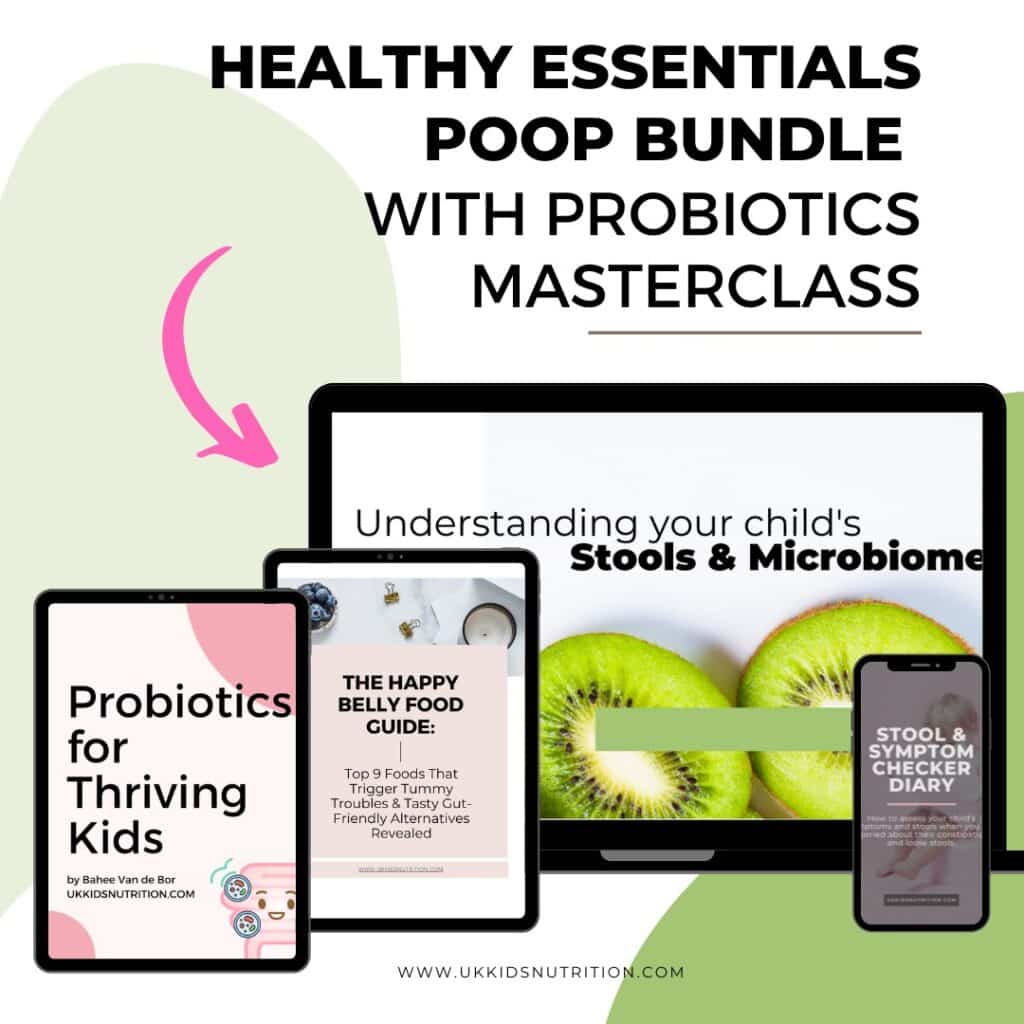
Heart Health
Oats are renowned for their heart-healthy properties.
They can help lower total cholesterol levels, which, in turn, reduces the risk of heart disease in adults.
The beta-glucan in oats is particularly effective in this regard.
It’s therefore a good idea to help children love meals like porridge from as early as the weaning stage.
Weight Management
Oats are a filling food due to their high fibre content.
Consuming oats can help control appetite, making it easier to manage and maintain a healthy weight.
Stable Blood Sugar
Being a whole grain, oats help in stabilising blood sugar levels, thanks to their low glycemic index.
This is beneficial for children and adults with diabetes or those looking to maintain stable energy levels.
Nutrient-Rich
Oats are a good source of essential nutrients.
They provide a source of vitamins (like B vitamins), minerals (such as magnesium and iron), and antioxidants.
They provide a well-rounded nutritional boost.
Digestive Health
Oats’ fibre content, including both soluble and insoluble fibre, supports healthy digestion.
It can help prevent constipation and promote regular bowel movements.
Skin Health
The antioxidants in oats can benefit skin health. Oatmeal is often used in skincare products to soothe and moisturise the skin, making it suitable for sensitive or irritated skin.
Reduced Blood Pressure
Some studies suggest that regular oat consumption may contribute to lower blood pressure, which is essential for cardiovascular health.
Antioxidant Properties
Oats contain antioxidants, such as avenanthramides, which help combat oxidative stress and inflammation in the body.
Versatility
Oats are incredibly versatile and can be incorporated into various dishes.
Think breakfast cereals, smoothies, and granola to savoury meals like soups and stews.
Economical and Sustainable
Oats are an affordable and environmentally sustainable food source, making them an eco-friendly choice for those concerned about their carbon footprint.
Including oats in your family’s diet can provide a wide range of health benefits, making them a nutritious and practical addition to your daily meals.
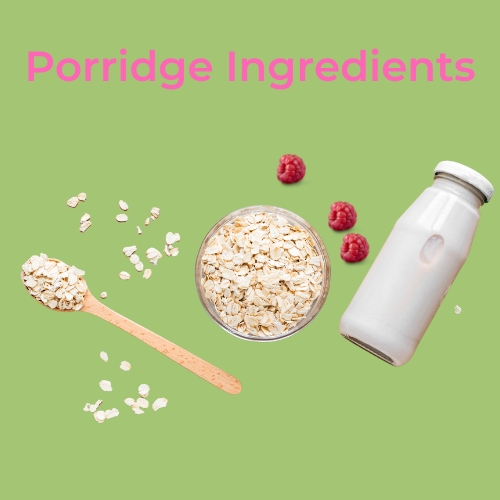
What About Oat Bran for Kids?
- Fibre-Packed: Oat bran is rich in soluble fibre, especially beta-glucan, which is crucial for maintaining healthy cholesterol levels and promoting heart health in children.
- Happy Tummies: Its gentle soluble fibre is excellent for aiding digestion, ensuring regular bowel movements, and offering relief from constipation, making it a comforting choice for sensitive young stomachs.
- Steady Energy: With a low glycemic index, oat bran provides sustained energy, preventing spikes and crashes, which is vital for keeping children focused and energetic throughout their day.
- Feeling Full: The fibre content in oat bran helps children feel fuller for longer, aiding in appetite control and healthy weight management.
- Nutrient Boost: Packed with essential nutrients such as B vitamins, iron, and antioxidants, oat bran is a nutritional treasure, supporting overall health and well-being.
- Versatile and Kid-Friendly: Easy to incorporate into various dishes, oat bran can be added to cereals, blended into smoothies, or used as a topping, making it a flexible and appealing option for kids.
Whether it’s mixed into a bowl of porridge, baked into muffins, or added to pancakes, oat bran is a versatile and nutritious addition to your child’s diet.
How Much Oats Can Children Eat?
Good news for parents: children can include oats in their daily diet, especially for breakfast, without any concerns.
Oats are a nutritious and versatile choice, making it easy for kids to incorporate them into their meals.
For breakfast, a serving size of around ½ to ¾ cup of cooked oats is a reasonable portion for most children.
This provides them with a hearty and satisfying start to the day.
You can customise it with a variety of toppings like fruits, nuts, or a touch of cinnamon to suit your child’s taste.
Moreover, snacks made from oats, like oat cakes or oat-based biscuits, can be a delightful and wholesome addition to your child’s diet.
These snacks can offer energy and nutrition while being a tasty treat.
Some children may enjoy oats daily, while others may prefer variety in their breakfast options.
As with any food, moderation and a balanced diet are key.
Steel Cut vs Rolled Oats vs Instant Oats – What’s Best for Your Child?
When it comes to oats, there are several options to choose from, each with its unique characteristics.
Let’s explore the differences between steel-cut oats, rolled oats, and instant oats to help you decide which is the best fit for your child’s diet.
Steel-cut oats (Known as Coarse Oatmeal in the UK)
These oats are the least processed, chopping the whole oat groat into pieces.
They have a chewy texture and a hearty, nutty flavour.
Steel-cut oats take longer to cook, but they retain more of their natural nutrients.
They’re an excellent choice for kids who enjoy thicker, heartier oatmeal and don’t mind the longer cooking time.
Rolled Oats
Also known as old-fashioned oats, these are made by taking whole oat groats and rolling them flat.
They cook faster than steel-cut oats and have a creamier texture.
Rolled oats are versatile and can be used in a wide range of recipes, from oatmeal to baking.
Instant Oats
For busy mornings, quick oats prepared with lactose-free milk provide a fast and easy breakfast solution.
However, as they will be digested more quickly, save these for occasional use.
The best choice for your child depends on their taste preferences and your family’s schedule.
Ultimately, all three types of oats are nutritious and can be a valuable addition to your child’s diet.
The key is to select the one that best aligns with your child’s taste and your daily routine.
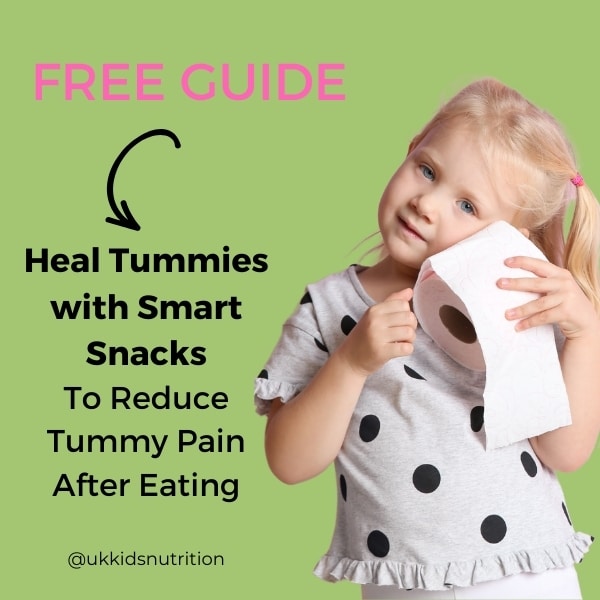
What About Oats and Gluten?
While oats are naturally gluten-free, they can be a part of a low FODMAP diet for children.
However, for children with Coeliac disease, cross-contamination during processing can be a concern.
For individuals without coeliac disease or non-coeliac gluten sensitivity, including children with IBS, oats can be a valuable part of a balanced diet.
Oats provide essential fibre and nutrients without gluten-related concerns.
Ensure that the oats you choose are labelled as “certified gluten-free” if your child has coeliac disease or a specific sensitivity to gluten.
In summary, oats can be a safe and beneficial option for children with IBS.
There’s no need to avoid gluten unless your child has a specific gluten-related condition.
Oat Recipes: How to Include Oats in Your Child’s Diet
Creative ideas for incorporating oats into your child’s diet are shared below, ranging from classic oatmeal to innovative recipes like oat smoothies and oat-crusted chicken tenders.
Oat based breakfast
- Classic Oatmeal/Porridge: Start with the basics. Cook porridge oats with water or milk and sweeten them naturally with a drizzle of maple syrup for added flavour. Then let your child customize their bowl with toppings like fruits, nuts, or a sprinkle of cinnamon.
- Homemade Granola: Prepare granola by mixing rolled oats with a touch of honey and a variety of nuts, seeds, and dried fruits. Bake until golden brown, and serve as a crunchy cereal or yoghourt topper.
- Oat Pancakes: Swap out some of the flour in your pancake recipe with rolled oats. These pancakes are heartier and more nutritious while maintaining their fluffiness.
- Oat Smoothies: Blend oats into your child’s morning smoothie for an extra fibre boost. The oats will provide thickness and creaminess to the drink.
Oat based snacks
- Oat Muffins: Add rolled oats to your muffin batter for a fibre-packed, grab-and-go breakfast or snack option. Mix in fruits like blueberries or mashed bananas for added flavour.
- Oat Cookies: Bake oat-based cookies with your child. You can use a portion of whole-grain flour to make them even healthier.
- Energy Bites: Combine oats with nut butter, honey, and your child’s favourite mix-ins (like chocolate chips or dried fruits) to create energy bites for a convenient, no-bake snack.
- Oat Bars: Make no-bake oat bars by combining oats, dried fruits, and a sticky binder like honey or peanut butter. Press them into a pan, chill, and cut into bars.
Oats in savoury options
- Savoury Oatmeal: Don’t forget that oats can also be savoury. Try making a savoury oatmeal with vegetables, cheese, and herbs for a delightful change of pace.
- Oat-Crusted Chicken Tenders: Crush oats and use them as a coating for chicken tenders or fish sticks. It adds a pleasant crunch and extra fibre to your child’s meal.
- Oat Crust for Pies: Instead of a traditional pie crust, consider using oats for a wholesome, nutty base when making dessert pies or quiches.
- Oat Milk: If your child is lactose-intolerant or prefers non-dairy/milk free milk, you can try oat milk. It’s an excellent dairy milk alternative that you can use in cereals, smoothies, or baking.
Remember to involve your child in the kitchen whenever possible.
This not only makes meal preparation a fun family activity but also encourages them to try new things.

What’s a Good Breakfast with IBS?
Porridge Oats: As already mentioned, oat-based porridge is a nutritious breakfast option for children. Cook with lactose-free milk or oat milk if required.
Alternatives to Porridge for Managing IBS Symptoms
For those seeking variety, we explore alternative foods that are equally beneficial for IBS.
These include other low FODMAP, high soluble fibre meal options that can help manage IBS symptoms.
Here are some options to consider:
- Low-FODMAP Smoothie: Blend a ripe banana (make sure it’s spotted), lactose-free yoghurt, a handful of oats, spinach, a few blueberries, and a teaspoon of chia seeds. This smoothie is both gut-friendly and delicious.
- Scrambled Eggs: Scrambled eggs with bloat-free bread are a quick and easy option. Pair them with some diced tomatoes, which are typically low in FODMAPs, and a sprinkle of chives.
- Lactose-Free Yogurt: Top lactose-free yoghurt with low-FODMAP fruits like kiwi, oats and a small handful of chopped almonds for crunch.
- Quinoa Porridge: Cook quinoa in lactose-free milk and add a drizzle of maple syrup or a touch of cinnamon for flavour. Top with raspberries or a small serving of strawberries.
- Low-FODMAP Breakfast Burrito: Use corn tortillas to create a breakfast burrito with scrambled eggs, and a sprinkle of cheese and cooked vegetables.
It’s crucial to remember that individual triggers for IBS symptoms can vary, so it’s a good idea to keep a food diary and consult with a healthcare professional or a registered dietitian to create a personalised breakfast plan that works best for you or your child.
Also, if you’re interested in low-FODMAP breakfast ideas, check out the “Ten Delicious Low FODMAP Breakfast Recipes” for even more gut-friendly options.
Bottomline
Incorporating porridge into an IBS-friendly diet for your child can be a game-changer.
Rich in soluble fibre, low in FODMAPs, and versatile, it’s a nutritious choice for managing IBS symptoms.
If you’ve been wondering ‘is porridge good for IBS’, now you know the answers.
But whether it’s porridge for breakfast or as part of a regular meal, its benefits for gut health and overall well-being are substantial.

Let Me Help
If you’re seeking more personalised guidance or in-depth information, consider exploring my specialized programs and resources:
- Online Course: “Happy Belly Blueprint” – This comprehensive course offers detailed strategies and insights to enhance gut health and solve tummy troubles in children.
- 1-2-1 Programme: “Happy Belly Club” – Tailored for individual needs, this program provides one-on-one support to master the challenges of IBS in kids.
- FREE Guide: Don’t miss out on the valuable insights in “Heal Tummies With Smart Snacks”. Download this free guide to start making positive changes today.
- CHAT With Bahee: Book a free initial consultation to discuss the Happy Belly Club.
Each of these resources is designed to empower you with the knowledge you need to support your child’s gut health.
